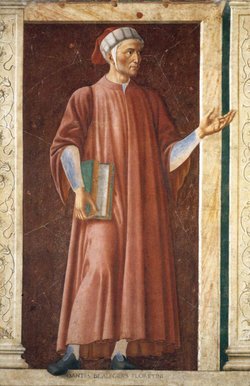 Dante (on Wikipedia)
Dante (on Wikipedia)
Dante Alighieri (1265-1321) is generally considered the greatest of Italian poets, and also one of the greatest poets that Western civilization has produced. His reputation is primarily based upon his magnum opus The Divine Comedy. He was active in politics during the early part of his life and took an active interest in church reform.
The Divine Comedy by Dante Alighieri remains today one of the pillars upon which the European literary tradition has been built. Originally titled simply Commedia, Dante's masterpiece was written at the end of his life and finished just before his death in 1321. In an era of hand-copied manuscripts, it reached a large and appreciative audience quickly. By the year 1400, no fewer than 12 commentaries devoted to detailed expositions of its meaning had appeared to support the text. Giovanni Boccaccio wrote on the poet's life and in 1373-1374 delivered the first public lectures on Dante's Commedia.
The Divine Comedy is also important for its place in the history of the development of the Italian language. Dante opposed the assumptions of his day that prescribed Latin as the only appropriate language for serious writing. He advocated the use of a courtly Italian enriched with the best of every spoken dialect to form a serious literary language. This would help to unify the separated Italian territories by the creation of a national culture, an end to which Dante strived his entire life. While falling short of his goal of unification, Dante did use his native Tuscan as a basis for several of his works, including The Divine Comedy. The impact of his work upon the culture of the Italian peninsula helped to establish his Tuscan dialect as the ancestor of modern Italian.